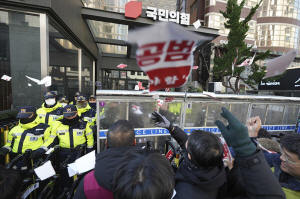South Korea's Justice Ministry imposes a travel ban on President Yoon
over martial law
 Send a link to a friend
Send a link to a friend
 [December 09, 2024]
By HYUNG-JIN KIM and KIM TONG-HYUNG [December 09, 2024]
By HYUNG-JIN KIM and KIM TONG-HYUNG
SEOUL, South Korea (AP) — South Korea’s Justice Ministry on Monday
imposed an overseas travel ban on President Yoon Suk Yeol as authorities
investigate allegations of rebellion and other charges in connection
with his short-lived declaration of martial law last week.
Yoon’s martial law decree last Tuesday, which brought special forces
troops into Seoul streets, plunged South Korea into political turmoil
and caused worry among its key diplomatic partners and neighbors. On
Saturday, Yoon avoided an opposition-led bid to impeach him, with most
governing party lawmakers boycotting a parliamentary vote. But the
opposition parties vowed to submit a new impeachment motion against him
this week.
Bae Sang-up, a Justice Ministry official, told a parliamentary hearing
that it banned Yoon from leaving the country following requests by
police, prosecutors and an anti-corruption agency as they expand their
probes into the circumstances surrounding Yoon’s power grab.
On Monday, a senior National Police Agency officer told local reporters
in a background briefing that police can also detain Yoon if conditions
are met. The contents of the briefing were shared with The Associated
Press.
While a sitting South Korean president has immunity from prosecution
while in office, that does not extend to allegations of rebellion or
treason. This means that Yoon can be questioned and detained by police
over his martial law decree, but many observers doubt that police will
forcefully detain him or search his office because of the potential for
clashes with his presidential security service.

In the case of former President Park Geun-hye, who was thrown out of
office in 2017 after being impeached by parliament over a corruption
scandal, prosecutors failed to search her office and ended up receiving
documents outside the compound because presidential officials turned
them away.
After refusing to meet with prosecutors while in office, Park underwent
questioning by them and was arrested after the Constitutional Court
approved her impeachment and ruled to dismiss her as president in March
2017.
The main opposition Democratic Party called Yoon’s martial law
imposition “unconstitutional, illegal rebellion or a coup.” It has filed
complaints with police against at least nine people, including Yoon and
his former defense minister, over the rebellion allegations.
South Korean prosecutors on Sunday detained former Defense Minister Kim
Yong Hyun, who allegedly recommended that Yoon declare martial law. He
became the first person detained in the martial law case.
[to top of second column]
|

Members of the Korean Confederation of Trade Unions throw torn
papers carrying the names of the ruling party's lawmakers who didn't
vote at the impeachment motion last week, during a rally in front of
the ruling People Power Party's head office in Seoul, South Korea,
Monday, Dec. 9, 2024. (AP Photo/Lee Jin-man)

The Defense Ministry last week separately suspended three top
military commanders over their alleged involvement in imposing
martial law. They were among those facing the opposition-raised
rebellion allegations.
On Saturday, Yoon issued an apology over the martial law decree,
saying he won’t shirk legal or political responsibility for the
declaration. He said he would leave it to his party to chart a
course through the country’s political turmoil, “including matters
related to my term in office.”
Since taking office in 2022 for a single five-year term, Yoon, a
conservative, has been on a near-constant collision course with his
liberal rivals who control parliament. The liberals have introduced
a slew of motions seeking to impeach some of his top officials and
launched a fierce political offensive against Yoon over a spate of
scandals involving him and his wife.
In his martial law announcement on Tuesday night, Yoon called
parliament a “den of criminals” bogging down state affairs and vowed
to eliminate “shameless North Korea followers and anti-state
forces.”
Yoon’s martial law decree lasted only six hours because the National
Assembly voted it down, forcing Yoon’s Cabinet to lift it before
daybreak Wednesday. Some members of Yoon’s governing People Power
Party cast ballots against Yoon’s decree, but the party later
decided to oppose his impeachment.
Experts say Yoon’s party fears losing the presidency to liberals in
a by-election if he is impeached and ousted, as they did after Park
was removed from office.
PPP leader Han Dong-hun said Sunday his party will push for Yoon’s
early and orderly exit from office in a way that minimizes social
confusion, but he didn’t say when that would happen. He also said
Yoon will not be involved in state affairs, including foreign
policy.
Critics say Han likely wants to buy time to help his party restore
public confidence. His comments on sidelining Yoon from state
affairs have also sparked widespread concern and criticism that it
violates the constitution.
During a Monday briefing, the Defense Ministry said Yoon maintains
control of the military, a power the constitution explicitly
reserves for the president.
All contents © copyright 2024 Associated Press. All rights reserved |